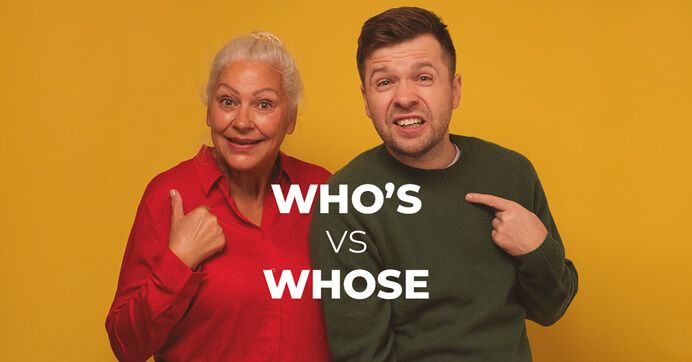
Who’s vs. Whose: How to Use Each Correctly
“Whose” is the relative pronoun to ask to whom something belongs, and “who’s” is a shortened form of “who is.”
In English, all question words except “How” start with the letters “Wh,” which is why informative questions are frequently called “Wh-Questions” and can be quite confusing. Here’s another pair of homonyms that give English writing a headache: whose vs. who’s.
“Whose” is the relative pronoun to ask to whom something belongs, and “who’s” is a shortened form of “who is.”
Using “whose” in a sentence
When you ask who owns a certain thing/something, you should use the interrogative word “whose.” The most frequent pairing is with a noun. The noun can be eliminated if we are speaking about the subject (to which subject?) that you are alluding.
Whose book is the one right beside the window?
Whose are these (textbooks)?
When the relative pronoun changes the possessive pronoun (his, her, their), we use “whose”:
Huw is the boy whose grandparents live in our area.
Madonna, whose parents were born in Italy, is a famous American singer.
The relative pronouns like the three famous ones “who,” “that,” and “which” can be the subject or object of the relative clause:
I spoke to the lady who was taking her dog out for a walk down to the park.
In this case, “who” is the subject, not “the lady.”
How to use “who’s” in a sentence?
A contraction of “who is” or “who has” is “who’s.” It is present at the outset of a query:
Who was/Who’s putting the books away?
Who was/Who’s owning that dog?
Huw, who is/ Who’s getting a cat, often has pair of extra cookies in his pocket.
The mistake between “it’s” and “its” in the possessive form of “it” is quite similar to the confusion between “whose” and “who’s.” It is primarily because humans tend to read any word ending in an apostrophe as possessive instinctively.
Keep in mind that “whose” is possessive. In other words, whose is typically followed by a noun. You should use whose if a noun follows the whose or who's in the sentence. Use who's if there is neither a noun nor an article.
When to use Who vs. Whose?
Understanding each term's root is essential to use “whose” and “who’s” appropriately. You’ll better understand how each word works in a sentence once you understand the pronoun on which these two words are based.
“Who” is short for “what person.” So, asking the question “Who is he?” is an example.
“Who’s” is a shortened version of “who is,” such as “Who’s he?”
As said before, “whose” is a possessive pronoun that we use only with nouns.
Example sentences
Who is/Who’s the lofty man in the short jacket?
My friend, who has/ who’s just left for the office, will be back in a few hours.
Did you see whose yellow car is parked on the other side of the street?
Whose green backpack is this sitting on that chair?
“Who’s idea” or “Whose idea”?
The question is to whom the idea belongs, so the correct phrase here is “whose idea.” To be sure in these types of examples, just ask yourself, “to whom does this idea belong?” or “who came up with this idea?” In short, the phrase is about determining who owns the idea or the concept. As a result, rather than a contraction like “who is,” we need a possessive pronoun like “whose.”
These things can sometimes be confusing even if you have good grammar. If you are not sure in which cases which phrase to use or how to confirm that the correct answer is “whose,” try replacing the word with the phrase “who is.” Then it’s very simple if the sentence doesn’t make sense, “whose” is not a correct phrase. However, the sentence makes sense, and “whose” is correct.
“Whose fault” or “Who’s fault”?
Both phrases can be correct in this particular case, but it depends on what you are trying to say. As a result, depending on the context, either of them can be correct, and you can still get it wrong if you use it in the wrong context. You can try in the sentence to see which one fits better. For example, if you’re trying to figure out who is to blame, the correct way to phrase this would be “whose fault.” That’s because “whose” is a possessive pronoun, which means it’s used to indicate possession or ownership.


















